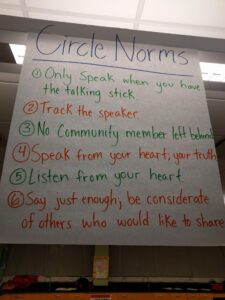So much hope lies in the ability of our brains to be shaped by experience and environment. The changes that we see in the brain in relation to chronic stress are reversible with the right environment. Research continues to suggest that RELATIONSHIPS are the most important determinant in healing from trauma. Supportive and nurturing environments can help re-calibrate the system and strengthen the neural pathways that support trust and healing.
Students can begin to engage their thinking brains only when they feel safe. Through relationships with students we communicate that they can trust us and they belong here. It is critical that they feel seen and heard in our classrooms and within the school. We can think of each positive, nurturing interaction as a chance to re-sculpt the brain.
Active Listening
One of the most important relationship building skills is LISTENING. We all (hopefully) do this everyday – both verbally and non-verbally. Our listening stance and HOW we listen lead us back again to self-regulation. We can think about this concept as it relates to trauma-informed schools in so many ways. When we are in “survival brain” – how are we showing up from our students? Where are we coming from? Are we even listening? What is true for us is also often true for kids. What about our students? When they are in “survival brain” – it makes sense that they are not hearing us.
Active Listening is a practice that can be utilized at any point (baseline/crisis/recovery) to build, strengthen, repair relationships. The essence of the practice is to “to listen for meaning” – what is underneath the words and behaviors – what are the underlying thoughts, feelings, needs, fears? By listening in this way we are sending the message that student perspectives and feelings are understood and taken into consideration. Active listening helps students feel heard and put words to their emotions which is a skill of our thinking brains. When are emotions and needs are validated we are able to let our guards down – active listening therefore is a powerful co-regulation skill.
 Community Building Circles
Community Building Circles
Circles provide time and space within the classroom that allows for community building and student expression and help to foster RELATIONSHIPS and REGULATION. Circles (morning meeting, restorative circles, Socratic circles, etc.) can be utilized to provide an opportunity for connectedness, open expression and democratic principles within the classroom. Community Building circles are an important piece of the Restorative Practices continuum. They can be used to check in and out with your class daily, collaborate on classroom/activity norms, express emotion, build relationship and solve problems. In a circle, everyone has an opportunity to contribute and power is shared among the group.
Morning Meeting with NOLA Kindergarten teacher
Additional Resources
Relationships
-
SEARCH Institute’s Developmental Relationships Framework
-
SEARCH Institute’s Relationships Check-up Tool
-
Safe Schools NOLA Relationships Reflection Tool
-
Brief Intervention to Encourage Emphatic Discipline (Oknonofua et al., 2016)